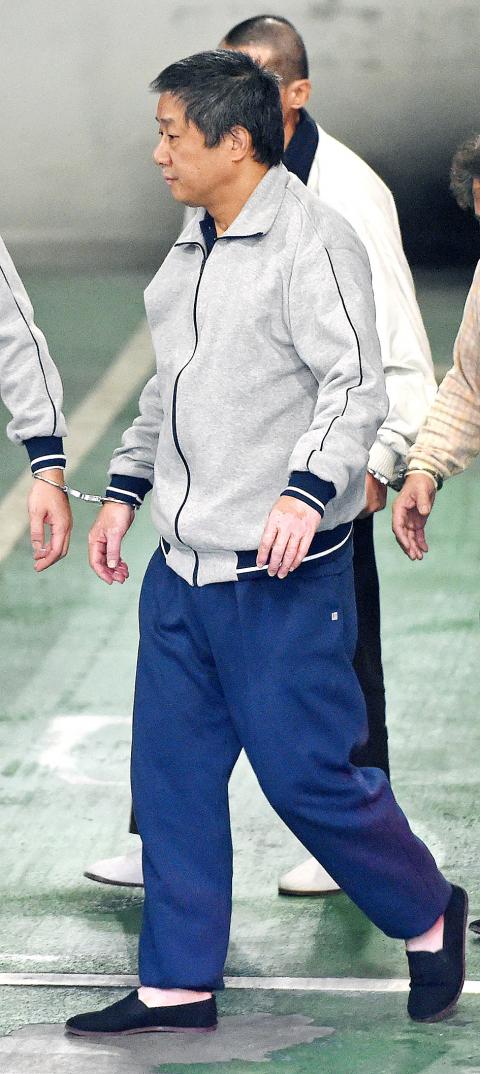Taipei prosecutors yesterday indicted five Taiwanese, including four retired military officers, and a retired Chinese army officer on charges of espionage and leaking state secrets, in a case authorities said involved the largest Chinese spy ring that had operated in Taiwan for some years.
The Taipei District Prosecutors’ Office said the spy ring, allegedly headed by former People’s Liberation Army (PLA) officer Zhen Xiaojiang (鎮小江), had passed classified military information about Taiwan’s radar stations, advanced aircraft and other weapon systems to China.
“Zhen was under instruction to recruit both retired and active service Taiwanese military officers to develop a network for espionage against Taiwan, which has done severe damage to our national security,” the office said in a statement.

Photo: Liao Chen-huei, Taipei Times
Previous reports have said that Zhen, who reportedly joined China’s intelligence agency after retiring from the PLA, obtained Hong Kong residency in 2005, and had since entered Taiwan numerous times on business and tourist visas.
The Taiwanese defendants are former army major-general Hsu Nai-chuan (許乃權), air force colonel Chou Chih-li (周自立), air force pilot Sung Chia-lu (宋嘉祿), air force official Yang Jung-hua (楊榮華), and Lee Huan-yu (李寰宇), a Greater Kaohsiung nightclub operator.
According to prosecutors, through the retirees he recruited, Zhen was able to make contact with active duty officers who had access to classified materials, which he handed over to a senior Chinese military intelligence official known by the pseudonym of Mao Shangyu (毛尚云).
Investigators said the spy ring passed on classified information on the Mirage 2000 aircraft, the ultra-high-frequency radar installation on Leshan (樂山) in Hsinchu County, and more sophisticated military weaponry and technology.
Prosecutors allege that Zhen paid his informants about NT$300,000 and provided free trips to Southeast Asia in return for the classified military material, and arranged for some of them to meet Chinese intelligence officers while abroad.
Prosecutors said investigators are still following up the leads, and the probe could be expanded and more charges filed.
Hsu served as a commander of Kinmen’s defense command, a commander at the Republic of China Military Academy in Greater Kaohsiung and was once in charge of defense on Matsu.

SECURITY: As China is ‘reshaping’ Hong Kong’s population, Taiwan must raise the eligibility threshold for applications from Hong Kongers, Chiu Chui-cheng said When Hong Kong and Macau citizens apply for residency in Taiwan, it would be under a new category that includes a “national security observation period,” Mainland Affairs Council (MAC) Minister Chiu Chui-cheng (邱垂正) said yesterday. President William Lai (賴清德) on March 13 announced 17 strategies to counter China’s aggression toward Taiwan, including incorporating national security considerations into the review process for residency applications from Hong Kong and Macau citizens. The situation in Hong Kong is constantly changing, Chiu said to media yesterday on the sidelines of the Taipei Technology Run hosted by the Taipei Neihu Technology Park Development Association. With

A US Marine Corps regiment equipped with Naval Strike Missiles (NSM) is set to participate in the upcoming Balikatan 25 exercise in the Luzon Strait, marking the system’s first-ever deployment in the Philippines. US and Philippine officials have separately confirmed that the Navy Marine Expeditionary Ship Interdiction System (NMESIS) — the mobile launch platform for the Naval Strike Missile — would take part in the joint exercise. The missiles are being deployed to “a strategic first island chain chokepoint” in the waters between Taiwan proper and the Philippines, US-based Naval News reported. “The Luzon Strait and Bashi Channel represent a critical access

CARROT AND STICK: While unrelenting in its military threats, China attracted nearly 40,000 Taiwanese to over 400 business events last year Nearly 40,000 Taiwanese last year joined industry events in China, such as conferences and trade fairs, supported by the Chinese government, a study showed yesterday, as Beijing ramps up a charm offensive toward Taipei alongside military pressure. China has long taken a carrot-and-stick approach to Taiwan, threatening it with the prospect of military action while reaching out to those it believes are amenable to Beijing’s point of view. Taiwanese security officials are wary of what they see as Beijing’s influence campaigns to sway public opinion after Taipei and Beijing gradually resumed travel links halted by the COVID-19 pandemic, but the scale of

Pope Francis is be laid to rest on Saturday after lying in state for three days in St Peter’s Basilica, where the faithful are expected to flock to pay their respects to history’s first Latin American pontiff. The cardinals met yesterday in the Vatican’s synod hall to chart the next steps before a conclave begins to choose Francis’ successor, as condolences poured in from around the world. According to current norms, the conclave must begin between May 5 and 10. The cardinals set the funeral for Saturday at 10am in St Peter’s Square, to be celebrated by the dean of the College